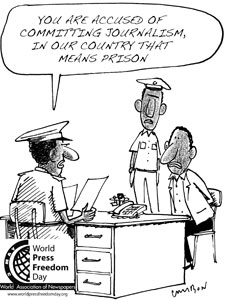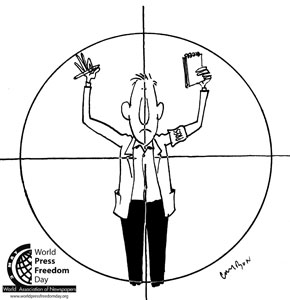"I got put in jail in Zimbabwe for simply doing my job. They said I was 'committing journalism' and I hope they were right."
That's how Barry Bearak of The New York Times described his arrest, brief detention and expulsion from Zimbabwe for trying to report from the country during the last elections (see interview below). Bearak's plight was widely reported in the global media and created a storm of indignation and protest in the international community. As many as a thousand journalists are arrested in the world each year, however, the dramatic, often tragic, stories of the vast majority of them go untold.
At least 125 journalists are currently in prison serving significant jail terms — and more than 400 have been murdered in the past decade. To report on corruption, to challenge government policies, to investigate organized crime — these are just a few ways to get a one-way ticket to prison or the cemetery in dozens of countries.
Why do these journalists take the risk, voluntarily put themselves and their families in the firing line? Each man or woman's story is different, but all are united in one idea at least: that without the right to inform and express ideas freely, one cannot demand any other rights.
World Press Freedom Day on May 3 is an annual occasion to reaffirm this idea and to turn the spotlight on repressive governments which deny their people this freedom. It is a day to support and understand the fundamental relation between press freedom and democracy and all human rights.
There are countless stories to be told and remembered on May 3. Barry Bearak, The New York Times' co-bureau chief in Johannesburg circumvented a draconian press law in Zimbabwe that severely restricted coverage of the presidential elections. His reporting mission was cut short when 21 police officers raided his hotel room. He spent four days in a concrete cell before being expelled from the country.
Moussa Kaka, director of the private radio station Saraouniya Radio was imprisoned for 384 days for his coverage on the Niger Justice Movement, which has been engaged in a long rebellion against the government.
"The rebellion in the North is the most important story in Niger, yet no one can cover it because the government censors everything", says Moussa Kaka.
"People are always talking about modernizing Africa, but that is not possible as long as journalists are going to jail for what they write or say," he said. "You want democracy, then let the press do its job. And, if intimidation worked, this job wouldn't exist, or at least I wouldn't be doing it. I am ready to go back to jail, no hesitation."
Such stories are common. Mohammad Ali-Al Abdallah, a 26-year old Syrian blogger and human rights activist whose father and brother were both jailed for criticizing Syrian policies and calling for reform, was briefly detained before he fled the country for the United States, where he continues to write his blog, I'm leaving and I'm not coming back, which is censored in his home country.
"We are getting arrested, like traditional journalists, and although it is shameful, it means that we are doing something right," said Al-Abdallah.
In Yemen, Abdel Karim Al-Khaiwani, spent a year behind bars for his reportage on high-level corruption, nepotism, and human rights abuses. Al-Khaiwani, is now facing another six-year sentence, and is frequently barred from leaving the country to attend international meetings on press freedom.
"I refuse to submit to or to put up with intimidation. I refuse to give up the principles of freedom and justice. I protest against despotism, oppression and all forms of harassment," he says.
In Colombia, 130 journalists have been killed over the past 30 years, for articles that cover guerrilla warfare, high-level corruption and drug trafficking. Claudia Julieta Duque, who has battled court cases, faced death threats and has left the country on three occasions in fear that her investigative reporting would have deadly consequences, says:
"I strongly believe that the only way to achieve real press freedom in Colombia is to ensure that all of us defend it together. Regardless of personal differences, focuses, or ideas - the right to express is above all interests and sensitivities."
This repression isn't only a problem for journalists and bloggers, but for all of us, since we rely on them to take the risks and report the stories. Mohamad Ali Al-Abdallah of Syria says there is much that can be done.
"From attending court hearings to supporting the family of imprisoned journalists, everyone can contribute in their own way, at their own scale," he says.
The writer is Director of Communications and Public Affairs at the World Association of Newspapers.
Courtesy World Association of Newspapers |


